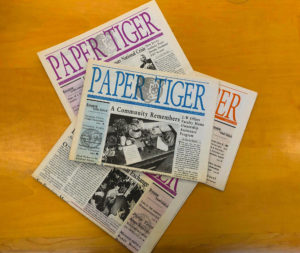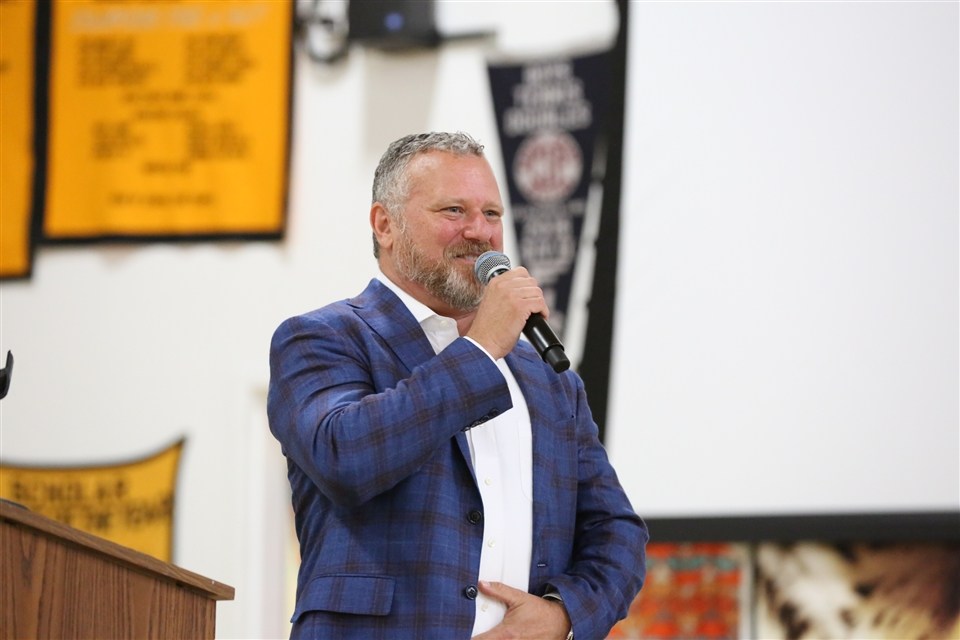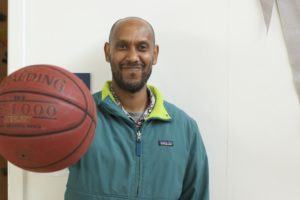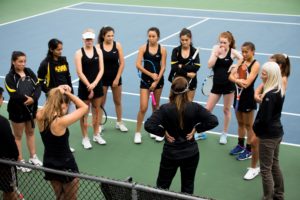Four hours after two airplanes struck the Twin Towers on September 11, 2001, a shaken student body, faculty, and staff gathered in Lick-Wilmerding High School’s Ehrer theater. Faculty and staff were concerned for the wellbeing of the students.
Thelonious Johnson, an English teacher at Lick Wilmerding, described, “a sense of trying to reassure the students that they would be okay.”
September 11, 2018 was the 16th anniversary of the September 11th attacks. Lick’s last graduating class with members born before 9/11/2001 barely noticed.
Aniket Joshi ’19, a senior at Lick, noted that the only discussion he had this year about 9/11 was in his Ethnic Studies class. “She [Catherine Fung, his teacher] allowed us to talk about 9/11 in our generation,” says Joshi. “There wasn’t that much discussion. The main thing was understanding how 9/11 affects us since we are not of age to remember it or perceive how it affected the world.”
Eric Temple, Lick’s head of school, offered a brief remark about 9/11 before moving on to the rest of assembly on the Monday before.
Temple said there was no discussion among faculty and staff about mentioning 9/11 to the student body. There were discussions during his first two years as head of school from 2011 to 2012. “There was a big debate in the country-and it was something we did here [at Lick] too-is whether 9/11 should be a national day of recognition,” said Temple. He continued, “we would ask students to weigh in on that debate each 9/11.”

Although Lick-Wilmerding very briefly recognized 9/11 this year, high schools in New York dedicated significant attention.
Jason Beeferman, a senior at John L. Miller High School in Great Neck, New York said this year the Friday before 9/11, his principle delivered a prepared statement to the school during morning announcements. In much of New York there was no school on the following Tuesday, the 11th of September, but that holiday was in respect of Rosh Hashanah.
The difference in reaction between Lick and Beeferman’s high school made sense to Beeferman because in New York, “it’s not uncommon for you to meet someone who has been directly affected by 9/11. Most kids in my school have parents who work in New York City, so they know what happened.”
Still, he too recalled a serious shift in commemorations in the years since 2001.
Beeferman recounted a middle school class “where we spent half the year, or a third of the year talking about 9/11.”
He believed the passage of time plays a large factor in the diminished attention to the tragedy. “We don’t talk about Pearl Harbor [except in history classes]–for my grandparents’ generation–that’s a huge date, the date that lives in infamy,” said Beeferman.
Alex Dangas, a high school senior at the all-girls, K-12 Chapin School on the Upper East Side of New York City, agreed. “Over the years, as time goes by, it is a little less emotional. The world heals,” said Dangas.
Although Dangas’ school didn’t start until the 12th of September this year, the headmaster normally gathers the entire school, presents a slideshow with images and videos, and gives a speech in which he asks the student body to look back, and share their feelings attached to the event.
Dangas said the reason why 9/11 is still so meaningful to New Yorkers is because, “Every single family was affected that day.”
Beeferman agreed. “I remember talking about it with my friend, and he was talking about how [that day] his mom walked all the way from her office in the city to Long Island.” He continued, “I know exactly what was happening with my dad and my dad talks about he saw smoke coming out of the skyscrapers from his office, coming out of the towers.”
Beeferman and Dangas’ experiences are very different from students at Lick.

Shaun Lopez, a history teacher at Lick, believed students at Lick should be more knowledgeable about the impact of 9/11. “It would be great if future generations had a bit more perspective on events like this,” said Lopez.
Lopez’s reasoning was that, “9/11 is obviously a tragedy for America, a lot of people lost their lives, but understanding that moment in a vacuum has had a huge negative impact on our country and on the world.”
The attacks incited increasing animosity toward immigrants, led to new and important laws, and altered Americans’ understandings of privacy and race.
Youssou Fall, a tech arts teacher at Lick, originally from Senegal, agrees with Lopez that 9/11 spurred a lot of significant change to the U.S. “It was a national event. It was a thing that really changed U.S. policies, it was a catalyst in a lot of things,” said Fall.
The tragedy changed the way Americans view outsiders–especially those from the Middle East or those who appear to be from the Middle East.
Joshi recalled that, originally, “I had never considered [that] all the feedback I was getting in terms of 9/11 was negative: you did this, your people did this.” His response had been, “it’s not my people who did that.”
Fall held similar connections to the attacks, “In Senegal as a Muslim I have never had experienced racism,” said Fall. However, he continued, “in the United States, even within the Muslims… you will experience racism.”
Fall believed that students in general should be taught about the event. “I think regardless of the location you were in, the ramifications of 9/11 are so big it has to be acknowledged.”
More specifically to Lick, Fall said, “I think for me the reason why it has to be acknowledged is for those who were not born in 2001: to know what happened, to know this can happen again, but specifically–I’m not just talking about what happened on 9/11–but all the domino effects that came after 9/11 and changed our lives. That has to at least be acknowledged.”






